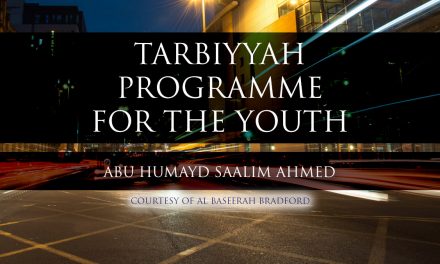We begin with Surah Al-Ikhlaas, which is a refutation upon the Mushrikoon. This Surah speaks about the oneness of Allaah. There are two Surahs known as Ikhlaas- Surah Al-Kafiroon and this Surah. This Surah is also known as Surah At-Tawheed.
This Surah was revealed because the Mushrikeen said to the Messenger of Allaah (Sallallaahu Alayhi Wa Sallam) give us the lineage of your Lord; so Allaah revealed this Surah.
This Surah equates to a third of the Quran. Something may equate to something, but this does not necessarily mean it suffices; for example, if a person recites Surah Al-Ikhlaas in prayer three times but left off Surah Al-Fatiha, then the prayer is not accepted.
قُلۡ هُوَ ٱللَّهُ أَحَدٌ (١)
Say: “He is Allâh, (the) One. (1)
قُلۡ
Is an address to the Messenger of Allaah (Sallallaahu Alayhi Wa Sallam) showing the importance of what will come after it.
ٱللَّهُ ٱلصَّمَدُ (٢)
[Allâh the Self-Sufficient Master, Whom all creatures need, (He neither eats nor drinks)]. (2)
ٱلصَّمَدُ
Is that He is complete in all of his attributes- His Hearing, Seeing, Knowledge, and all other attributes; and this necessitates that he is free from everything.
لَمۡ يَلِدۡ وَلَمۡ يُولَدۡ (٣)
“He begets not, nor was He begotten;[] (3)
This is a refutation upon those who falsely claim that Allaah has children.
وَلَمۡ يَكُن لَّهُ ۥ ڪُفُوًا أَحَدٌ (٤)
“And there is none co-equal or comparable unto Him.” (4)
From this Surah we can see the establishment of Tawheed and the falsehood of the claims of the mushrikoon, likewise we see the obligation to worship Allaah alone, and the affirmation of the attributes of Allaah, without resembling them to creation.
Surah Al-Falaq is known as such due to the opening ayah. The topic of this Surah is to seek refuge from the evil of creation, and a lesson to the servants to return back to Allaah.
The ending of the Quran has a connection to the beginning of the Quran. The Quran begins with seeking aid, and finishes with seeking refuge. In the beginning, a person is in need of guidance. In the end, a person is in need of protection upon that guidance.
This Surah and Surah An-Naas were revealed due to the story of the witchcraft that was carried out against the Messenger of Allaah by a Jew, to the point that the Prophet (Sallallaahu Alayhi Wa Sallam) began to imagine things that he hadn’t done.
قُلۡ أَعُوذُ بِرَبِّ ٱلۡفَلَقِ (١)
Say: “I seek refuge with (Allâh) the Lord of the daybreak, (1)
مِن شَرِّ مَا خَلَقَ (٢)
“From the evil of what He has created; (2)
The meaning here refers to all of creation.
وَمِن شَرِّ غَاسِقٍ إِذَا وَقَبَ (٣)
“And from the evil of the darkening (night) as it comes with its darkness; (or the moon as it sets or goes away) (3)
Many of the evil affairs occur within the night time.
وَمِن شَرِّ ٱلنَّفَّـٰثَـٰتِ فِى ٱلۡعُقَدِ (٤)
“And from the evil of those who practise witchcrafts when they blow in the knots, (4)
وَمِن شَرِّ حَاسِدٍ إِذَا حَسَدَ (٥)
“And from the evil of the envier when he envies.” (5)
This includes the one who has evil eye.
Surah An-Naas takes its name due to the opening ayah. The topic is similar to the previous Surah- to seek refuge in Allaah from Iblees and the devils from amongst the men and jinn that help Iblees.
قُلۡ أَعُوذُ بِرَبِّ ٱلنَّاسِ (١)
Say: “I seek refuge with (Allâh) the Lord of mankind, (1)
مَلِكِ النَّاسِ (٢)
“The King of mankind (2)
إِلَـٰهِ ٱلنَّاسِ (٣)
“The Ilâh (God) of mankind, (3)
The Ilah referred to here is the Ilah that is worshipped in truth- Allaah.
مِن شَرِّ ٱلۡوَسۡوَاسِ ٱلۡخَنَّاسِ (٤)
“From the evil of the whisperer (devil who whispers evil in the hearts of men) who withdraws (from his whispering in one’s heart after one remembers Allâh)[] , (4)
ٱلَّذِى يُوَسۡوِسُ فِى صُدُورِ ٱلنَّاسِ (٥)
“Who whispers in the breasts of mankind, (5)
مِنَ ٱلۡجِنَّةِ وَٱلنَّاسِ (٦)
“Of jinn and men.” (6)
This Surah has a command to seek refuge with Allaah against Shaytaan; likewise we see that the aid is sought with the Lordship of Allaah. We also see the enmity that Shaytaan has with the children of Adam.








